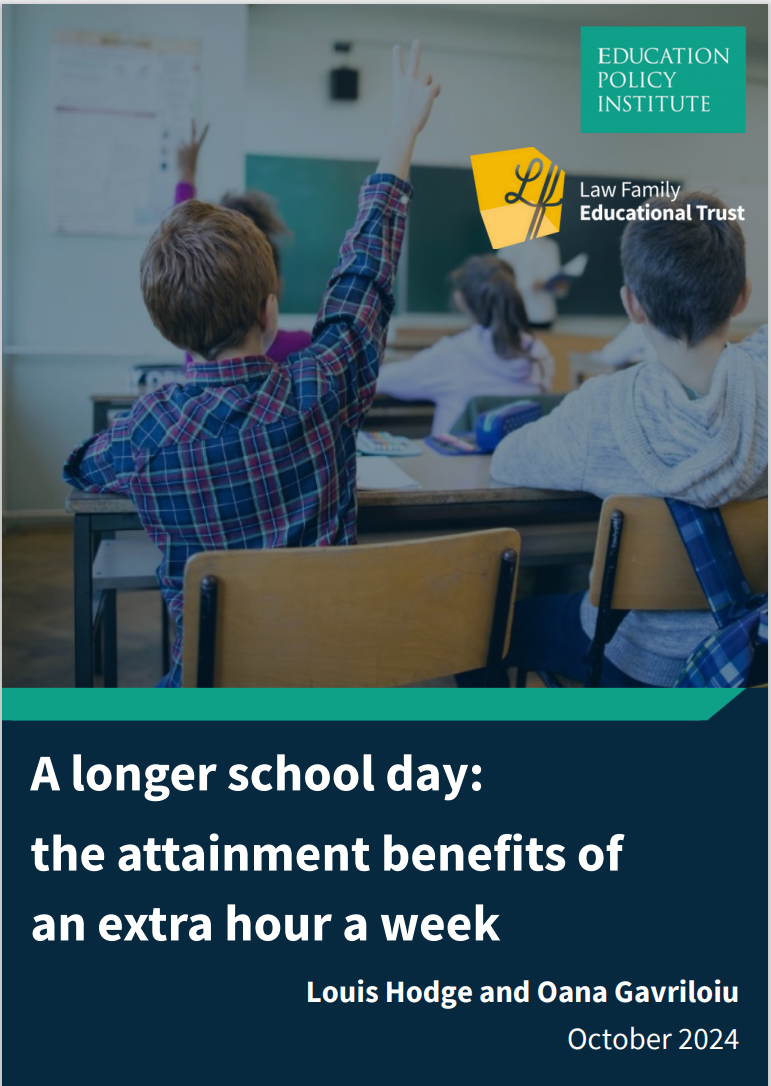This new report published by the Education Policy Institute, funded by the Law Family Educational Trust, finds a modest positive association between the time pupils spend in school each week and academic attainment in England.
This research uses a new Department for Education data collection from schools on the length of their school weeks.
It finds that the majority of schools are meeting the previous government’s expectation that schools should deliver a 32.5 hour week by September 2024.
Through linking this new data to other data available in the National Pupil Database (NPD), it also explores, for the first time in England, the relationship between time in school and attainment outcomes at the end of primary and secondary school.
It finds a modest positive association consistent with existing international evidence, as explored in our literature review published earlier in the year.
The report finds that:
In 2023/24, four fifths of primary schools and three quarters of secondary schools had school weeks that were 32.5 hours or more, as per the previous government’s expectation for this term.
- Free schools have longer school weeks than other types of school: In 2023/24, free schools had on average almost an additional hour (primary) and over an hour (secondary) of school time per week compared with the average school. This is potential due to the greater flexibility free schools have over their school days.
- Academically selective secondary schools have longer school weeks: Academically selective secondary schools have on average, a school week that is almost one hour longer than non-selective schools.
- Schools rated ‘Outstanding’ by Ofsted and those in London tend to have longer school weeks: ‘Outstanding’ schools have school weeks that are between 10 and 20 minutes longer, and pupils attending secondary schools in London have over half an hour extra time in school a week, when compared to the typical school.
- At the school level there is no identifiable link between the proportion of pupils eligible for free school meals (FSM) and the length of the school week.
Additional time in school is associated with a small, yet positive, effect on overall attainment at the end of both primary and secondary school.
- The magnitudes of the associations at secondary school were found to be slightly smaller compared to primary school. An additional hour of weekly secondary school time is associated with a 0.17 grade improvement in one GCSE subject.
- The associations with English/reading test scores are slightly larger than for maths: Differences are small – an additional hour of school a week in primary schools is associated with improvements in Key Stage 2 scaled scores of 0.053 and 0.066 for maths and reading, respectively.
- At secondary, an additional hour has a substantially larger association with attainment in language subjects: An additional hour of school a week at secondary school is associated with a 0.063 grade improvement in language GCSEs, much larger than the estimated 0.018 grade improvement in English, 0.014 in maths, 0.016 in science, and 0.017 in humanities GCSEs. It is plausible this larger association with respect to languages is due to factors we cannot observe in the data, given the available measures of prior attainment and relatively low take-up of language subjects.
The report highlights that whilst increased time in school is found to be associated with small improvements in academic attainment, further consideration should be given to what activities take place in any extra time and to whether the additional cost of increasing school time could be better used on other interventions which are known to improve in attainment.
You can download and read the full report here.

This report has been kindly funded by the Law Family Educational Trust.


